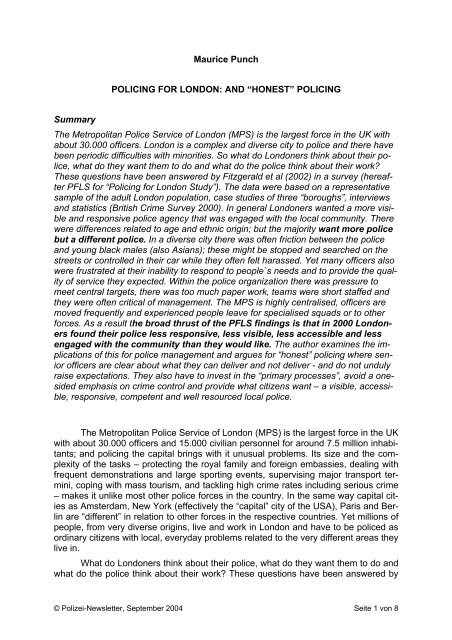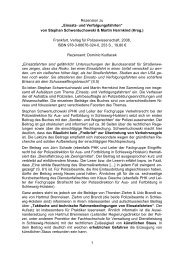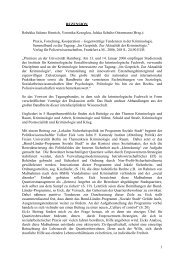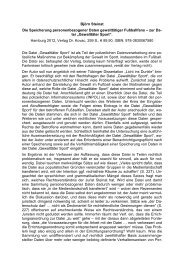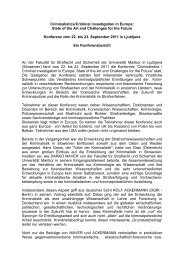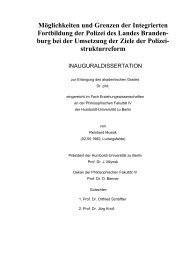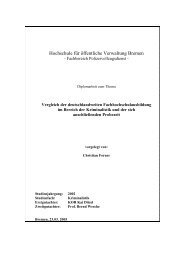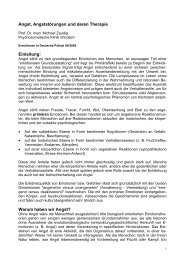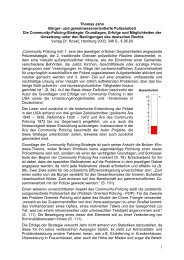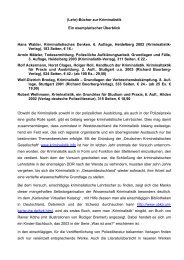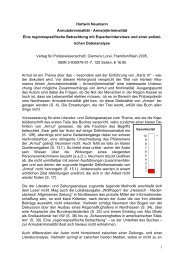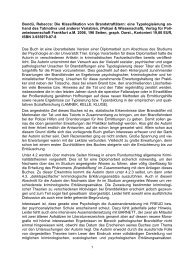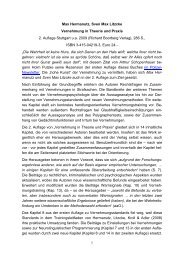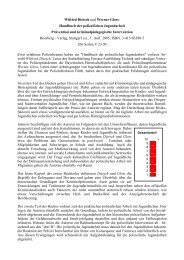POLICING FOR LONDON - Polizei-Newsletter
POLICING FOR LONDON - Polizei-Newsletter
POLICING FOR LONDON - Polizei-Newsletter
Create successful ePaper yourself
Turn your PDF publications into a flip-book with our unique Google optimized e-Paper software.
Maurice Punch<br />
<strong>POLICING</strong> <strong>FOR</strong> <strong>LONDON</strong>: AND “HONEST” <strong>POLICING</strong><br />
Summary<br />
The Metropolitan Police Service of London (MPS) is the largest force in the UK with<br />
about 30.000 officers. London is a complex and diverse city to police and there have<br />
been periodic difficulties with minorities. So what do Londoners think about their police,<br />
what do they want them to do and what do the police think about their work?<br />
These questions have been answered by Fitzgerald et al (2002) in a survey (hereafter<br />
PFLS for “Policing for London Study”). The data were based on a representative<br />
sample of the adult London population, case studies of three “boroughs”, interviews<br />
and statistics (British Crime Survey 2000). In general Londoners wanted a more visible<br />
and responsive police agency that was engaged with the local community. There<br />
were differences related to age and ethnic origin; but the majority want more police<br />
but a different police. In a diverse city there was often friction between the police<br />
and young black males (also Asians); these might be stopped and searched on the<br />
streets or controlled in their car while they often felt harassed. Yet many officers also<br />
were frustrated at their inability to respond to people`s needs and to provide the quality<br />
of service they expected. Within the police organization there was pressure to<br />
meet central targets, there was too much paper work, teams were short staffed and<br />
they were often critical of management. The MPS is highly centralised, officers are<br />
moved frequently and experienced people leave for specialised squads or to other<br />
forces. As a result the broad thrust of the PFLS findings is that in 2000 Londoners<br />
found their police less responsive, less visible, less accessible and less<br />
engaged with the community than they would like. The author examines the implications<br />
of this for police management and argues for “honest” policing where senior<br />
officers are clear about what they can deliver and not deliver - and do not unduly<br />
raise expectations. They also have to invest in the “primary processes”, avoid a onesided<br />
emphasis on crime control and provide what citizens want – a visible, accessible,<br />
responsive, competent and well resourced local police.<br />
The Metropolitan Police Service of London (MPS) is the largest force in the UK<br />
with about 30.000 officers and 15.000 civilian personnel for around 7.5 million inhabitants;<br />
and policing the capital brings with it unusual problems. Its size and the complexity<br />
of the tasks – protecting the royal family and foreign embassies, dealing with<br />
frequent demonstrations and large sporting events, supervising major transport termini,<br />
coping with mass tourism, and tackling high crime rates including serious crime<br />
– makes it unlike most other police forces in the country. In the same way capital cities<br />
as Amsterdam, New York (effectively the “capital” city of the USA), Paris and Berlin<br />
are “different” in relation to other forces in the respective countries. Yet millions of<br />
people, from very diverse origins, live and work in London and have to be policed as<br />
ordinary citizens with local, everyday problems related to the very different areas they<br />
live in.<br />
What do Londoners think about their police, what do they want them to do and<br />
what do the police think about their work? These questions have been answered by<br />
© <strong>Polizei</strong>-<strong>Newsletter</strong>, September 2004 Seite 1 von 8
Fitzgerald et al (2002) in a survey (hereafter PFLS for “Policing for London Study”).<br />
Their data can be compared with a survey from 20 years previously. But both pieces<br />
of research have to be put into context.<br />
For in 1981 heavy-handed policing in the racially-mixed area of Brixton<br />
sparked off severe rioting. In his report on the disturbances Lord Scarman (1981)<br />
argued for a stronger emphasis on policing by the “consent” of the public and by involvement<br />
in the community. This became the orthodoxy for policing during the eighties.<br />
And in the wake of his report the Policy Studies Institute (or “PSI”; Smith: 1983)<br />
conducted a survey of the public and the police. At the time this caused a lot of consternation<br />
as there were reports of racism, sexism, poor supervision and rule-bending<br />
among officers along with a substantial minority of the population who had serious<br />
allegations of misconduct by the police (e.g. undue violence and manipulating evidence).<br />
There can be little doubt that some officers were racist in opinion and behaviour.<br />
Since then there has been a considerable effort to reduce discrimination, to recruit<br />
more police from minorities and to be more aware of policing a “diverse” population.<br />
Then in 1993 a black youth, Stephen Lawrence, was murdered in London by<br />
an unprovoked attack by a group of young white men. Various failures in the police<br />
investigation meant that no convictions were forthcoming, although the suspects had<br />
been identified in the media, and widespread public and political dissatisfaction led to<br />
a public inquiry (Macpherson: 1997). This accused the MPS of “institutional racism”.<br />
Effectively since then the MPS has been trying to gear its policing to working with a<br />
diverse population in a “professional” manner, free of prejudice.<br />
The PFLS allows us to look at current opinions about policing London as well<br />
as comparing that data with the original PSI findings. The data were based on a representative<br />
sample of the adult London population, weighted to contain more black<br />
and Asian respondents, case studies of three “boroughs” (local government areas<br />
which are also police districts), focus groups and interviews and some statistical material<br />
(including the London sub-sample of the 2000 British Crime Survey). What are<br />
the main findings?<br />
Fear of crime had not substantially risen in 20 years. But anxiety was high<br />
in poor areas and Londoners of minority ethnic origin expressed more concern given<br />
the sorts of areas they lived in with high crime rates and with their fear of racial attacks.<br />
What had increased was concern with “incivilities” – street dealing and the accompanying<br />
litter of used needles, disorderly teenagers, graffiti, vandalism and accumulated<br />
rubbish. People wanted the police to reassure them about protection<br />
from the threat of crime and disorder.<br />
In particular, they wanted a more visible and responsive police agency that<br />
was positively engaged with the local community. There were differences related<br />
to age and ethnic origin; the young and those from minorities were understandably<br />
less keen on foot patrol than others as they were more likely to be stopped. Yet the<br />
vast majority believed that the police should have powers to stop and search suspects.<br />
“Stop and search” tactics have been widely criticised as it is held that minorities<br />
tend to be prime targets for control; and resistance to them sparked off the Brixton<br />
disturbances in 1981. They did argue for stops, however, which were soundly<br />
based on grounds of reasonable suspicion; also for more attention to “others”, preferably<br />
outside of their territory, while black respondents were more resentful of being<br />
© <strong>Polizei</strong>-<strong>Newsletter</strong>, September 2004 Seite 2 von 8
stopped. This wide support for stop and search sounds surprising except that many<br />
respondents in poor areas are themselves likely to be victims of crime.<br />
They want more police but a different police; officers who engage with the<br />
local community and with whom they can interact in a non-confrontational way.<br />
Over a third of Londoners had sought some sort of help from the police<br />
in 1999-2000. More than half of this was in relation to crime but almost the same<br />
percentage had other reasons, say reporting noise or disturbances. Victims of crime<br />
were generally satisfied with the police response. But the percentages for “most satisfied”<br />
had fallen, and for “dissatisfied”, had risen in 20 years. Dissatisfaction arose<br />
from feelings that the police displayed lack of interest or too little effort; the “result”<br />
was not as important as having police who showed interest and kept you informed on<br />
your case.<br />
A quarter of Londoners were approached by the police in that year. Generally<br />
this was in a car but also on foot; many young men under 35 had experience of<br />
being stopped by the police and this was especially true for young black males. The<br />
best demographic predictor of being stopped was young, black, single and working<br />
class. This is reminiscent of American officers who speak of “driving while black” as<br />
grounds for controlling an African American car driver. Less people were stopped<br />
than in the early eighties but more Asians were subject to control. The majority of<br />
respondents were happy with police behaviour during controls but those who were<br />
young or lived in poor areas, or from minorities, were more likely to be dissatisfied<br />
than others. A third of the sample stated that they or someone they knew were really<br />
annoyed by police conduct; the best predictor for this was being black, young, middle<br />
class and owning a car (owning a car gave a larger chance of being controlled and<br />
being middle class meant the individual was more likely to resent being selected for<br />
police attention).<br />
Confidence in the police had fallen in 20 years; less felt they did a “very<br />
good job” and more considered that they did a bad job; but this decline has been witnessed<br />
more widely in British police forces and not just in London. The police were<br />
ranked lower in public confidence than other public services but highest within the<br />
criminal justice system. In focus groups there were strong feelings among young<br />
people, of all ethnic origins and in various areas, that police activity is biased against<br />
them. About a third of the sample thought the police treated ethnic minorities unfairly<br />
and this had risen since 1983; but most people thinking this were mostly white (minority<br />
views were fairly stable). There had been a rise in willingness to help the police<br />
while more people from minorities were prepared to consider joining the police.<br />
Police views of areas tended to be based on a perception of how willing people<br />
were to cooperate with them. Those living in deprived, high-crime areas were<br />
seen as negative and this was compounded by the fact that calls for assistance in<br />
those areas were often confrontational. Many officers were frustrated at their inability<br />
to respond to people`s needs and to provide the quality of service they<br />
expected.<br />
Within the police organization there was pressure, they lamented, to meet targets<br />
that were not very relevant to most of the local calls they answered, there was<br />
too much paper work, teams were short staffed and they were often critical of management.<br />
They felt they were in a no-win situation with different sections of the local<br />
© <strong>Polizei</strong>-<strong>Newsletter</strong>, September 2004 Seite 3 von 8
community who saw them as biased in favour of other ethnic groups. Then in<br />
contacts with minorities there was a high chance that they would immediately claim<br />
discrimination so there was even a tendency to avoid contact with these groups. Officers<br />
were often moved around London and found it difficult to adjust to the new<br />
groups they encountered in different boroughs (there is an increasing number of<br />
people from countries in the Middle East). Senior officers were caught between central<br />
demands and the needs of local residents; often they had little chance to get to<br />
know their personnel and to keep up morale and performance.<br />
The broad thrust of the PFLS findings is that in 2000 Londoners found<br />
their police less responsive, less visible, less accessible and less engaged with<br />
the community than they would like.<br />
In essence, nearly everyone wants more police but with a different style; and<br />
officers would like to adjust to the needs and demands of the public. So why isn’t that<br />
happening?<br />
- crime has been falling since the mid-nineties (except for street robberies, often<br />
recently of mobile phones); in some ways, then, the work load had not become<br />
heavier except perhaps in terms of involvement in multi-agency cooperation<br />
- the public`s expectations had doubtless risen as the police had positioned<br />
itself more as a service organization and with the rise of critical public sector<br />
consumerism<br />
- police resources had fallen while the MPS loses many experienced officers<br />
to outside forces where the work is less hazardous and housing is cheaper<br />
- relentless government pressure to abide by centrally set performance<br />
measures, with an emphasis on crime fighting, limited the capacity of the local<br />
police to react to community needs<br />
- the MPS is also a highly centralised organisation which restricts local commanders`<br />
discretion in policing their own boroughs; furthermore, the crimefighting<br />
focus and the reaction to many forms of crime led to setting up specialised<br />
units and this usually drew experienced personnel away from the<br />
uniformed branch<br />
- officers in focus groups were cynical about “management” because the emphasis<br />
on centralisation and quantitative targets disempowered middle managers<br />
and demoralised the “front-line” workers (but it must be said that such<br />
cynicism is almost universal in police culture)<br />
- training was held to be inadequate for the situations encountered on the<br />
streets of London; there was much turnover of senior staff who were often<br />
moved after short periods in a borough so that they could not give continuity<br />
and leadership<br />
- all these factors accumulated to foster a large measure of dissatisfaction<br />
among officers; they felt unsupported by their senior managers, underrewarded<br />
and under-resourced.<br />
This is a sombre picture but I suspect it is true of many large, urban forces (and<br />
perhaps of many other forces as well). Policing has becoming increasingly complex<br />
© <strong>Polizei</strong>-<strong>Newsletter</strong>, September 2004 Seite 4 von 8
in many ways and especially in relation to the diversity in communities, particularly in<br />
certain cities. While many commentators would argue that the police should be investing<br />
in the “community relations” paradigm (or “COP”, for community oriented policing)<br />
with serious and professional attention to local needs, the British government<br />
(first under the Conservatives but just as firmly under Labour) has chosen for a crime<br />
fighting focus (Tonry: 2004). This, coupled with the emphasis on quantitative performance<br />
measures, represents an alternative, centrally imposed paradigm which<br />
limits local police discretion and undermines efforts to implement COP in the various<br />
districts.<br />
What do the authors propose as answers? They argue for<br />
- improved local consultation; focussing particularly on the “incivilities” that disturb<br />
people; a more visible and accessible police presence on the streets but<br />
with a clear sense of purpose and not just as symbolic “reassurance”; reinforce<br />
the capacity of officers to respond to calls with better integration of specialist<br />
and generalist work; give local managers more autonomy with increased<br />
flexibility to respond to local needs; and invest more energy in multi-agency<br />
partnerships.<br />
It could be said that there is nothing new here and I will return to this later. But the<br />
PFLS project has two main conclusions:<br />
Firstly, there is a legacy of discrimination and over-policing that overshadows<br />
relations with black people but this is related to the cycle of poverty, deprivation<br />
and high-crime rate areas where minorities tend to live; as the police<br />
focus disproportionately on the young they often get locked into adversarial<br />
and confrontational contacts with minority youth (black but increasingly Asian<br />
as well). It is crystal clear that the police in isolation cannot achieve better<br />
relations with minorities and this has to be a concerted effort by many agencies.<br />
Secondly, the police cannot be effective in tackling crime unless they reengage<br />
with the public. The use of quantitative performance measures<br />
geared to a narrow range of targets imposes short-term thinking while ignoring<br />
the interconnection between crime, disorder and incivilities; it has also drawn<br />
resources away from activities that win the trust of local people. Yet the police<br />
depend on that trust if they are to be well-informed about local patterns of<br />
crime and disorder. And they can only effectively tackle crime and disorder<br />
when local people are willing to play an active role in the identification and<br />
prosecution of those involved.<br />
Comment<br />
Although London can be seen as an exceptional city, I suspect that many police<br />
officers and others will recognise the dilemmas facing the police there as mirroring<br />
in some ways the problems they also encounter in other towns and regions. Here<br />
are my general reflections on the material presented by PFLS.<br />
- What strikes one immediately is how the police organization is wrestling with<br />
dilemmas and solutions that have been circulating for at least twenty<br />
years. The underlying ideas of COP, and POP (for “problem oriented policing”),<br />
have been familiar since the work of Goldstein (1979) and others and<br />
© <strong>Polizei</strong>-<strong>Newsletter</strong>, September 2004 Seite 5 von 8
seem to be periodically rediscovered, reinvented and regurgitated. Kelling,<br />
who is associated with “zero tolerance policing” (or ZTP) in New York (even if<br />
he now denies it), calls ZTP a new paradigm of COP. COP is apparently infinitely<br />
elastic - and can fit all sizes!<br />
- For over twenty years research has been telling us that people want a visible,<br />
approachable responsive, “local” police; and many police chiefs and politicians<br />
have been promising to deliver that “new-style” policing. What, then, hampers<br />
implementation?<br />
- The two major hurdles are politicians and police management. Politicians<br />
are increasingly fixated on crime and crime reduction and make demands on<br />
the police that the police cannot deliver. Every first-year lecture on crime control<br />
informs the students that the police alone can do very little to reduce crime;<br />
but politicians continue to ignore the overwhelming evidence for this. Neoliberal<br />
thinking with a focus on targets, ranking agencies on performance and<br />
quantification of output has amplified this one-sided governmental thrust and<br />
leads to distortion in policing.<br />
- Police managers are caught between the crime control model and the<br />
community involvement model. In theory these should not be incompatible;<br />
indeed, the PFLS report, along with much other material, maintains that they<br />
are interlinked and complementary. But there are two factors which make it difficult<br />
to deliver both adequately. One is that the police organization itself is obsessed<br />
with crime control; its culture is primarily geared to catching crooks and<br />
to denigrating other efforts as “soft” and as marginal to the “core business”.<br />
And the other is that police managers are often not very good at the balancing<br />
act.<br />
- In London you have a population that wants more and better policing and officers<br />
who want to deliver it that but the organization and management are the<br />
stumbling blocks. Too centralised, too specialised, too many organizational<br />
changes, not enough resources and senior managers who are moved constantly<br />
and are too distant and middle managers with too little power. It may be<br />
related to the huge size of the organization and the complexity of the tasks in<br />
London but there is also an element of top management simply not being<br />
able to solve these glaring dilemmas.<br />
Perhaps I could try to resolve some of this by stating my own views on policing<br />
based on thirty years involvement with policing and police research. Rather than<br />
looking for some catchy label I prefer to speak of “honest policing” (see Bayley: 1994).<br />
The essence of this is to admit openly and with good arguments what you can do and<br />
can do it.<br />
Punches Principles for “Honest” Policing:<br />
- The police organisation is a complex service agency that delivers a number of<br />
services of which crime control and prevention is an important one. Its core business<br />
is ensuring safety, promoting tranquillity, combating disorder and preventing crime. In<br />
order to achieve this it has to have legitimacy and credibility among its diverse publics<br />
and this means a negotiated “policing by consent” model with citizens and others<br />
© <strong>Polizei</strong>-<strong>Newsletter</strong>, September 2004 Seite 6 von 8
as co-producers of safety. An over-emphasis on crime control runs the risk of destroying<br />
trust and alienating segments of the population.<br />
- Police leaders have to be clear, consistent and unambivalent. The police organization<br />
is the only 24 hours, accessible social service and in its response to calls from<br />
the public it has a crucial support function for citizens; research consistently reinforces<br />
the point that much police work is geared to helping people and not directly to<br />
law enforcement. This needs to be acknowledged as a crucial public service.<br />
- At the same time the police organization is a visible institution of the state which can<br />
interfere directly in the lives of citizens, deprive them of their freedom and, if necessary<br />
deprive them of their lives. On the one had this implies serious attention to human<br />
and civil rights; but, on the other hand, it also requires being “honest” with citizens.<br />
A police chief needs to repeat; “we are a social service primarily geared to the<br />
needs of the public; but if threatened my officers may, as a last resort, use lethal violence;<br />
by disturbances of public order my officers may use appropriate force and may<br />
deprive people of their freedom; in relation to crime control it may be necessary for<br />
my officers to stop and question people who turn out to be perfectly innocent of any<br />
crime or any suspicion. These tasks are part of our mandate and will be conducted<br />
with legality, professionalism, courtesy and accountability”.<br />
- This is being honest so that the public, and the police themselves, do not confuse<br />
the vital social task of the police as being incompatible with essential and “hard” control<br />
duties.<br />
- Honesty is also required in the delicate, intricate and prolonged negotiations that<br />
are required to generate community safety programmes. Senior officers have to deal<br />
with arousing undue expectations among diverse stakeholders and this means spelling<br />
out what the police are prepared to do and not do. And honesty is not promising<br />
what you cannot deliver.<br />
- Because if we recognise that the essential cutting edge of the police is delivering<br />
services in the community then the organization has to be geared to that strategically,<br />
structurally and culturally. As with all service organizations there has to be real investment<br />
in the primary processes. You could say that in many contemporary police<br />
organizations there is a conspiracy precisely to undermine those primary processes.<br />
- The police organization needs leaders who can manage and managers who can<br />
lead. Without the genuine investment by leaders from the top, who personally carry<br />
the message with conviction, not much will change. Honesty is saying to the essential<br />
front-line workers engaged in primary service delivery, and making the most important<br />
decisions in the organization, the following: “the leadership of this organization<br />
recognises the vital work that you do in delivering services to the community; we<br />
identify with those functions and will do all we can to provide adequate resources and<br />
training, to ensure continuity of personnel and supervisory staff, to coordinate your<br />
efforts with specialised units and to grant you the autonomy and discretion, within<br />
clear guidelines, needed to adapt to local needs and demands”. If a chief does not<br />
really mean that, or cannot deliver on the promises, then he or she should keep quiet.<br />
- Furthermore, that work has to be geared to what the public wants (e.g. with regard<br />
to dealing with domestic violence, fatal road accidents, and burglaries) as set out in<br />
“service delivery standards” as appraised by consumer satisfaction in a continual<br />
process of improvement.<br />
© <strong>Polizei</strong>-<strong>Newsletter</strong>, September 2004 Seite 7 von 8
- Finally, our enlightened chief has to be honest about governmental pressure and<br />
institutional targets; some form of pressure to achieve standards and to generate performance<br />
is healthy and appropriate; the key is quality over quantity and targets<br />
that are meaningful to local policing needs. But overemphasis on externally imposed<br />
quantifiable targets is fatal to motivation and to “tailor-made” local policing. That is<br />
surely one of the most significant conclusions of the PFLS report.<br />
In essence, a great deal of research has shown that policing is largely a “social<br />
service” driven by public demand; even in a diverse and difficult city like London<br />
people don’t want less policing; they want more policing but of a different<br />
sort. My point has been to say – look at the evidence and look at what people want -<br />
and then do the business. We should avoid slogans, labels and sound-bites that are<br />
misleading, that promise more then they can deliver or are some very old wine in new<br />
bottles. Police chiefs should be honest, come clean and state that what they can deliver<br />
and what they cannot deliver. Policing is about safety, security, service and<br />
keeping the peace within the rule of law and with the consent and satisfaction of the<br />
public. Any politician or police chief who disagrees with me, and I cannot conceive<br />
that anyone would now dare to do so (but “go ahead punk, make my day” to quote<br />
Dirty Harry), is ignoring what thirty years of research has been telling us and which<br />
the PFLS report confirms. I can provide them with a long reading list; or they can go<br />
back to the “shop floor” and rediscover what good policing is and what citizens want –<br />
a visible, accessible, responsive, competent and well resourced local police who “belong”<br />
in the area and not strangers who are constantly shifted around. People want<br />
their “own” police who take them as citizens, and the problems in their immediate<br />
locality, seriously and who treat them with consideration, competence and courtesy.<br />
Is that too much to ask?<br />
References:<br />
Bayley, D. (1994), Police for the Future. Oxford University Press.<br />
Fitzgerald, M., et al (2002), Policing for London. Willan.<br />
September 2004<br />
Goldstein, H. (1979), “Improving policing: a problem oriented approach”, Crime and Delinquency. April:<br />
236-158.<br />
Smith, D. (1983), Police and People in London. Policy Studies Institute.<br />
Tonry, M. (2004), Punishment and Politics. Willan.<br />
Maurice Punch studied and worked in the U.K., has worked in several countries (he has lived in the Netherlands<br />
since 1975), has researched corporate crime and various areas of policing (including corruption,<br />
reform and integrity), and has taught senior police officers. He has published in a wide range of journals in<br />
several countries and has written a number of books (including "Dirty Business: Exploring Corporate Misconduct":<br />
Sage: 1996). After twenty years in Dutch universities he became in 1999 Visiting Professor at<br />
the Mannheim Centre, London School of Economics. He has been involved in numerous conferences as<br />
presenter, organiser and chair including contributions for the Council of Europe, United Nations (Vienna)<br />
and National Institute of Justice (USA); he organized and chaired panels at the Global Forum on Fighting<br />
Corruption and Safeguarding Integrity II in The Hague and at the International Anti-Corruption Conference<br />
in Prague in 2001. He attended the “Police Use of Force” seminar at the Ruhr University of Bochum in<br />
2004 which was hosted by Prof. Thomas Feltes and with Prof. Feltes he wrote: “Good People, Dirty Work?<br />
Wie die <strong>Polizei</strong> die Wissenschaft und Wissenschaftler die <strong>Polizei</strong> erleben und wie sich <strong>Polizei</strong>wissenschaft<br />
entwickelt.“ To be published in: Monatsschrift fuer Kriminologie und Strafrechtsreform,<br />
2004/2005.<br />
Address (home/office): Veenendaalplein 8, NL 1185 DD AMSTELVEEN, THE NETHERLANDS,<br />
Tel.: 31 (0)20 - 641 2339, Fax : 31 (0)20 - 643 5496, E-mail: punch@xs4all.nl<br />
© <strong>Polizei</strong>-<strong>Newsletter</strong>, September 2004 Seite 8 von 8


